- Leading HANAC: Stacy Bliagos on Community Service in New York
- The Hellenic Initiative Celebrates Record-Breaking Weekend in New York
- Building the Future: HANAC’s 53rd Anniversary Gala Honors Advocates for Affordable Housing and Community Care
- Leona Lewis: Las Vegas residency ‘A Starry Night’
- Emmanuel Velivasakis, Distinguished Engineer and Author, Presents His Book at the Hellenic Cultural Center
Voice And Vision: Grigoris Maninakis, 50 Years Of Greek Music In America
by Athena Efter
Greek-born vocalist and musician Grigoris Maninakis has the distinction of being at the forefront of the Greek music scene in New York City for over 50 years. His promotion of and performances of Classical, Rebetiko, and “Entekhno” Greek music has also brought him to audiences all over the US and the world. He has worked with luminaries such as Mikis Theodorakis and Yiannis Glezos and co-founded the pioneering musical group, the Mikrokosmos Ensemble. He co-produced and performed in the groundbreaking, best-selling album “Cafe Aman Amerika.” Marinakis was also a key figure in the renaissance, really the “Golden Age” of live Entekhno performance in New York, from the 70s to the 90s, as co-owner of the Mikrokosmos club in Astoria. But, Maninakis hasn’t stopped there. He continues to perform and educates audiences all over about the rich cultural heritage of 20th century Greek music. And to that end he’s working on a new book that will cover the subject.
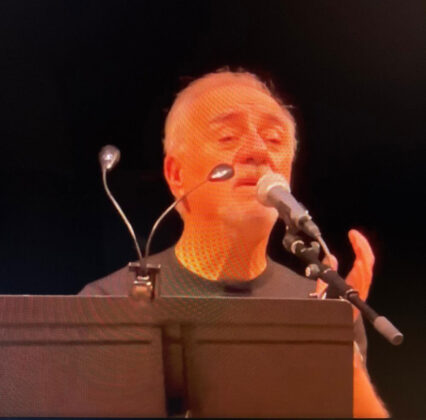
NEO sat down to talk with Maninakis about his remarkable journey and his continued travels in the world of Greek music.
I moved to New York in the early 90s. I remember going to the “boites” like Thiasos which were jam-packed every weekend. And I would hear the great stories about the Mikrokosmos club and Akroama. It was such a great time for anyone who loved Rebetiko and Entekhno and anything that wasn’t simply “Laiko.” But, sadly, it just doesn’t happen any more. At least on a “regular destination” basis. Why do you think that scene sort of died out?
The New York “boite era” lasted for more than one quarter of a Century (26 years) and involved five boites in total. Historically this is about the average “duration” of every “music and song” trend in Greece. This is not to say that the cost of operating a boite style music club and various other reasons were not factors in eventually ending the boite era in New York, as we knew and enjoyed it in the 80s and 90s.
To put this in context, the boite era started in 1977 with “Lazos Boite” (35-06 Ditmars Blvd in Astoria) established by guitarist/singer Serafim Lazos . In 1981 I bought the rights from Lazos with my friend Stavros Spandonidis and we established the “Mikrokosmos Boite” at the same place. Elly Paspalas and
I were the original singers of Mikrokosmos which – even today- is a point of reference for many Greek Americans of my generation. The Greek American media covered Mikrokosmos extensively while frequently publishing letters from fans of the boite. The most moving and flattering letter I recall is one that characterized Mikrokosmοs as “ΑΣΚΛΗΠΙΕΙΟΝ ΨΥΧΑΓΩΓIΑΣ» / “AESCULAPIAN CENTER OF ENTERTAINMENT”. Despite its success, the refusal of the owner to renew our lease, my partner’s decision to move to another state, and with my full time position at the university, I did not have the time to manage the every day operations, and Mikrokosmos had to close its doors in 1984.
The same year Vaggelis Fampas and Julie Ziavras opened the “Akroama” boite in Newtown Rd, in Astoria while in 1986, Mikrokosmos #2 was opened by my friend Leonidas Halikiopoulos a few blocks from the original/first one. Both of these boites – Akroama and Mikrokosmos #2 – while well organized ended operations by the 1990 -91.
“Thiasos” was the last “boite style “Greek music club in New York, and the only one that operated in Manhattan, from its opening – late ’80s /early ‘90s – to its closing in 2003, not being able to sustain the operating costs of a Manhattan club and its almost futile (wrong in my opinion) decision in early 2000, to compete with modern style pop music Greek night clubs. Thiasos closed its doors in 2003.
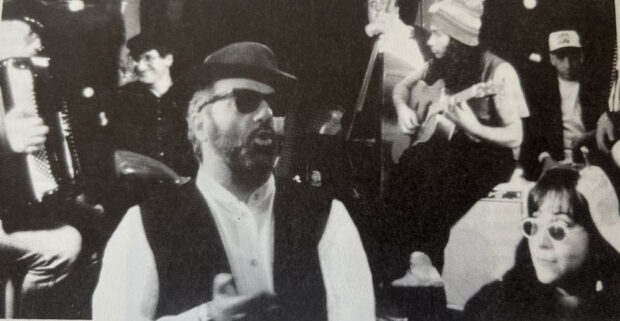
In the Spring of 1974, nearly six months after the Polytechnic uprising, you became part of Theodorakis’ newly formed Greek Popular Chorus Of New York. Was that your first time meeting the great composer? What was that experience like? How long did that Chorus last?
The Greek Popular Chorus of New York was founded in the spring of 1974. For me, it was the catalyst that got me involved in singing for the next 50+ years.
In early spring of 1974, the word was spread by several anti-junta organizations and through the Greek-American media that Melina Merkouri, Jules Dassin and Mikis Theodorakis were in New York inviting everyone to the well-known “Paradise” Greek restaurant in Times Square, in reference to a potential project of a documentary film about the November 1973 student uprising at the Polytechnic.
To a crowd of mostly young Greek-American men and women (and several non-Greeks) Theodorakis announced that he wanted to organize the Choir to participate in an anti-junta documentary called “The Rehearsal”, to be produced and directed by Melina Merkouri and Jules Dassin. Later we also learned that besides Melina Merkouri. several other actors and personalities would appear as themselves in the film, informing the world about the dictatorship in Greece. They were Olympia Doukakis, Lillian Herman, Sir Lawrence Olivier, Maximilian Schell, and Arthur Miller.
The idea was applauded by all, and thus, the Greek Popular Chorus was established with 50 of the participants signing up as the original “founding” members. Included was the well-known young composer Yiannis Glezos who was pursuing studies in New York at the time.
Rehearsals of the songs for the film stated right away and continued for several days with Theodorakis, conducting with Glezos on the piano that had been brought into the hall.
It is hard to describe the emotional state of all of us during that period. My personal feelings, can best be described by this characteristic incident.
At some point, Jules Dassin approached me and asked me to portray a police officer of the Junta for a scene in the film. Surprised and shocked, I politely refused for I COULD NOT bring myself to represent a Junta character, even though I knew it was only for the purpose of the documentary.
Besides its participation in the documentary, the Chorus gave its first public recital on April 14th 1974 at the ELLINIS Greek movie theater on Broadway in Astoria (to a full house- standing room only anti-junta crowd) under the direction of Mikis Theodorakis.
Shortly after that Mikis returned to Europe – I think Paris- and the Chorus continued to perform in New York, Boston and Pennsylvania under the direction of Yiannis Glezos . By that time, Elly Paspalas and myself were established as the soloists of the chorus. As such, we started to gain sufficient recognition as singers in the Geek American community.
When Glezos returned to Greece in 1975, 18 year old Elly Paspalas – a voice student at the Manhattan School of Music – took over the direction, continuing the Choir’s progressive performances with concert tributes, at various venues, including Carnegie Recital Hall and university campuses.
In conclusion, it would take many pages to enumerate in detail the cultural activities and contributions of the Greek Popular Chorus, from its establishment in 1974 to its end in 1978.
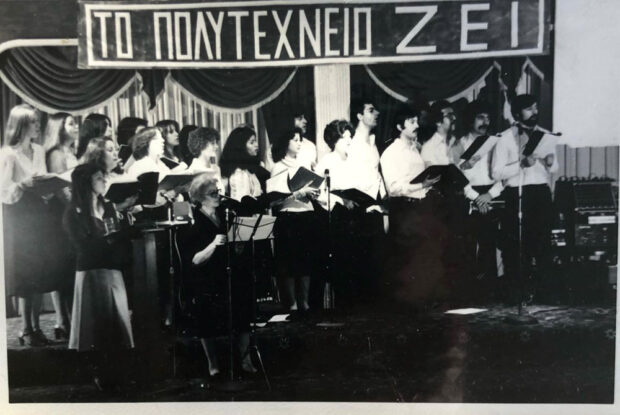
How would you summarize it in general terms?
The Greek Popular Chorus was a dynamic progressive and democratic minded group of Greek, Greek-American, and American young men and women with cultural and anti-junta political, non-partisan orientation. After the Polytechnic uprising and the Turkish invasion of Cyprus, the Chorus organized and /or participated in concerts against the military Junta and in support of the struggle of the Cypriot people against Turkey.
As such, the Chorus also contributed greatly to the Cultural upgrading of the Greek-American Community that led to the New York BOITE ERA of the 80s and 90s.
In the mid 1990s you were a big part of releasing the pivotal album/CD “Cafe Aman Amerika” a unique collection of songs of the early 20th century Greek-American diaspora that were rarely heard before. What was that experience like? Was there a big interest, at the time, from academia revealing these unique treasures in American history?
At the risk of sounding somewhat “self applauding”, I must say that, in many ways, the “Cafe Aman America” album was one of the most significant and ambitious Greek-American produced music projects in the second half of the 20th Century. The visionary idea belongs to the late Michael Adam (1957-2023) – at that time a friend, journalist, and colleague radio producer at Cosmos FM -91.5 FM in New York. Briefly, the rest of the story goes like this…
Dino Pappas, a retired Greek-American police officer in Detroit had a vast collection – nearly ten thousand tapes and records – with songs composed and recorded by the Greek immigrants in America in the 1920s, ‘30s. and ’40s. Keenly aware of their historical value and significance, he did not want them lost and wasted, and contacted Michael Adams for ideas. Michael was so impressed that he called me at the Cosmos FM studios to listen to some of the tapes Pappas had provided to him.
Despite the survival problems faced by these early immigrants, their songs, with humor, satire, and unique creativity, demonstrated a remarkable sensitivity and awareness of historic world events, as well as their personal day to day struggles and experiences – The Great Depression, the Prohibition Era, nostalgia of the homeland, working conditions, gambling etc.
My immediate instinctive and enthusiastic reaction was “Michael we must record and revive this treasure of songs”. He replied with the smile “Why do you think I called you here”? That was the defining moment that the “Café Aman America” album idea was born.
Our next step was to find and organize a group of musicians that could carry out the project. By the fall of 1994. through Michel’s efforts and my connections with musician colleagues, we had more than a dozen talented and experienced first and second generation Greek, Cypriot and USA born musicians join the group. At the same time, Michael Adams – as Executive Producer – had succeeded in securing the financial backing of New Jersey based Music World Productions, a Greek-American owned production company. The band worked tirelessly rehearsing and recording – sometimes until the early morning hours – and finally the CAFÉ AMAN AMERIKA album, as we know it today, was released in May of 1995.
The album contained 14 carefully selected songs with the most “GRINGLISH”(Hellenized words of the English language used by the immigrants) to portray the life of the immigrants at the time.
A most representative example is the song, “GIATI GLYKO MOU SWEETHERAT”. One specific line of the lyrics is very characteristic: “Να βγαίνεις date every night στο ξαναλέω black and white να σου ζητάω ένα φιλάκι και να μου λες πως εχεις στράκι (strike) ανεστε γκοντ (honest to God) αυτα δεν ειναι right. Ααααχ γιατί γλυκό μου sweetheart να με πληγώνεις τόσο hard”.
Αlthough the group did not appear much in the United States, it was invited and had several acclaimed performances in Greece and Europe. From July to October 1997, the performances of CAFÉ AMAN AMERIKA included concerts in Thessaloniki, the Herodion and Lecabettus theaters in Athens, as well as the concert halls of Utrecht, Holland and Brussels, Belgium.
Recently on April 5, 2025, honoring the 30th year of the Café Aman Amerika album, Ι had the opportunity – in cooperation with the St. Constantine and Helen Greek Community of Jackson Heights – to organize a sold out concert presenting the same songs in Astoria, with the participation of two of the original members of the group Glafkos Kontemeniotis and Lefteris Bournias.
What’s unique about your bio – that many folks might not know – is that you’re trained engineer and a Professor Emeritus of Engineering at SUNY. Was music always part of your life? Did you formally train in it? At what point did you realize that you could do this as a parallel career?
Regrettably, except for some introductory lessons in Byzantine music and a small number of private voice lessons in the ‘80s, I never had any formal musical training. Today, I deeply regret not learning a musical instrument and not mastering Byzantine music at its fullest.
In retrospect, recalling my youth, I can say that music was always finding a way to be in my life. For example, I fondly remember my first grade teacher on the island of Chios playing the violin and asking me to sing in front of the of the class.
Later, in the mid ‘50s, when we had to move to the island of Lemnos – at that time we had no radio at home and television was not yet around on the island – I was learning songs by listening to the ones played during the intermission at a nearby open space and summer movie theater near my house, by opening the windows.
My public singing started with the Greek Popular Chorus in 1974 and later, much more so, as a singer at the various Boites of New York, the Cafe Aman America orchestra, and my own band “Mikrokosmos Ensemble”, which I formed in the late ‘90s, performing in concerts and Greek Community social events in various venues including many universities all over the country.
Perhaps what is least known about me is that I have a degree in Physics from Adelphi University. I studied there for 4 years with a soccer scholarship, and completed two graduate degrees in Electrical Engineering at Columbia University in NYC by 1972. In the same year, I started my professional engineering career at a Long Island firm in charge of a design group, and, in 1979, I made perhaps the most important and critical personal decision that defined my career and my life to date.
You see, with a 9 to 5 job in the industry, it was impossible to pursue any kind of a career and my interests in music. Thus, in September 1979, I accepted a full-time position in the Engineering Faculty at the State University of New York (Farmingdale Campus) at a 50% reduction of my salary at the engineering firm. Not even for one second have I ever regretted my decision!!
My 41 years at the State University (I took retirement in 2020) – besides the challenge, the rewards, the satisfaction in teaching young people, the experience from serving as Chairman of the Department, and, for a short period, as Dean of the School of Engineering Technology – gave me enough free time to actively pursue in parallel my music interests. All that, in addition to more than 30 years of Byzantine chanting to date, in the Greek Orthodox communities of Astoria and Jackson Heights.
You still perform as part of the Mikrokosmos Ensemble, which is a wonderful thing for Greek music fans. Are there any performances or shows over the years that have stood out to you as special? Collaborations with other musicians?
In the fall of 1997, when I returned to New York after the Café Aman America concerts in Greece and Europe, I felt that it was time for me to be open to and pursue additional options in my music career. The owners of “Thiasos”, at the time the only remaining “boite style” music Greek club in New York, wanted me to sing there on a regular basis, but I offered to only be available on week days, not on the weekends. My plan was to compete in the music entertainment market, with my own “Mikrokosmos Ensemble” in a twofold direction: Doing concerts – always my most preferred activity – and being available to Greek-American communities for various social events, such as weddings, christenings, dinner dances, festivals, etc. throughout the country.
To date my musical endeavors with “Mikrokosmos Ensemble” have been the most rewarding in terms of artistic creativity, as well as support and acceptance by the public.
Of the many musical presentations/projects one of them stands out and makes me particularly proud. In 1998, I initiated a concert cultural event entitled “From Erotokritos to Axion Esti- From Kornaros to Elytis”, presenting the poetry of several well-known Greek poets, including two Nobel Laureats, Kornaros, Fereos, Gatsos, Varnalis, Seferis, Ritsos and Elytis, set to music by world-renowned Greek composers. Besides the songs, the performance includes relevant narrative in and recitation of specific poems in both Greek and English. The sold out premiere of this event was sponsored by “Hephaestus”, the Lemnian Philanthropic Association of America and took place in 1998 at the Chian House in Astoria.
Since then we presented it at several US universities – Princeton, Yale, Cornell, Rutgers, Stonybrook, Carnegie Mellon, University of St. Louis – as well as at the International Poetry Forum in Pittsburgh, The Gennadius Library in Athens, on Lemnos island in Greece, in New York City Libraries, and at Greek-American Schools in New York.
Who are your favorite composers whose work you most love to perform?
We are very fortunate as Greeks to have many great composers in all styles of music to select from for a performance. Over the years, I have organized and sung in many concert tributes to composers, singers, lyricists and poets, as well as various kinds of song styles and historic occasions. In all cases, when deciding which songs to perform in a concert or to include in the repertoire of a music event, the problem I struggle with is never which songs to “select”, but rather which songs to “leave out”, as the good choices have always been more than was needed. There are, however, some composers and songs that fit my voice better and style of singing, and I have chosen to perform them more often than others, such as songs by composers Kougioumtzis, Loizos, Zambetas, Xarhakos, Theodorakis, Hatzidakis, as well as many Rebetika composers such as Vamvakaris, Tsitsanis, Mitsakis, Skarvelis, Tountas, and others.
Do you agree that the age of digital streaming is hugely beneficial for access to “non-Laiko” genres? People can go on Spotify or Apple Music and discover Savvopoulos or Malamas, the early Rebetika works, the classic composers and so many more.
I believe it is beneficial, yet not being familiar with the specifics of Spotify, I do not have a substantive personal/empirical opinion about it. However, I routinely use youtube to search for various songs for my performances and/or my weekly “Greek Spin” radio show on WNYE- COSMOS 91.5FM every Monday from at 7 to 8pm.
In looking at the Diaspora in particular, how can we preserve interest in this musical tradition as newer generations become more disconnected from the language and many of the cultural traditions of the Motherland, including music?
This is the million-dollar question that addresses a real and concerning problem for the Diaspora. Specifically, as far as our musical tradition is concerned, I believe that the key to approaching a solution is by seeking, encouraging, and most importantly achieving direct and active participation of our youth in events that promote and maintain our cultural heritage. In other words, give our youth a real productive role in the various aspects of performing and organizing of these cultural events. Don’t just offer them a chance to attend an event, concert, play, etc.), but give them the opportunity to be part of it. Those who have talent can sing, others can be playing an instrument in the band, be the narrators, recite some lyrics or poetry, create the advertising material, manage the sound, the stage, etc. They will enjoy it and get a sense of “ownership” of it. Being directly involved, they will improve their Greek language skills, their understanding of the meaning of the words so they can interpret them accordingly when they sing or recite them, while inevitably learning the history behind the music. In a way – with my very limited resources – I have implemented this idea in my concerts for at least the last fifteen years, and I know it works.
As Greeks, we have been uniquely blessed with the kind of music tradition that is directly related to our history. Excluding the strictly commercial mass produced pop for the bright light night clubs, invariably behind every other kind of Greek song and musical work created by our composers, there is an historic event, an historic personality, a hero, often a world renowned poet or writer.
Here is some food for thought. Why don’t we introduce in the schools of our Greek-American communities a “must take all” course of History Through Music, including performing production management by students? Naturally it will require, vision and a genuine desire, motivation, and commitment from community leaders, parents, teachers, and putting our $$ where our self-evident cultural goals are. We know that our Greek-American community has strong financial potential and enough billionaires to implement such a project, in a holistic and sustained fashion, by skillful and knowledgeable professionals.
Dum spiro spero – Οσο αναπνέω ελπίζω – As long as Ι can breathe I hope.
To add to your accomplishments, you are now working on a book about that music scene of the 70s and 80s? What can we look forward to?
I have started this personal project in the fall of 2020. My goal is to describe, through first-hand personal experiences, an era that influenced and enriched the cultural life of the Greek-American community, from the 1970s to today.
The era of the Greek Popular Chorus of New York, The History of the New York Greek Boites , The “Café Aman Amerika” orchestra, and the “Mikrokosmos” band stories, as well other aspects as my personal musical journey in America.
I feel I owe this to myself and all others – friends, colleagues and others I did not get to know- who were part of this journey, and no one would have otherwise written something about.
Hopefully I will be able to finish it by the end of next year.


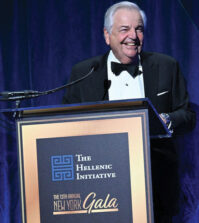
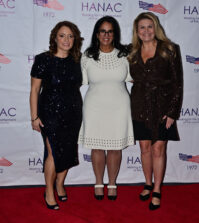











0 comments